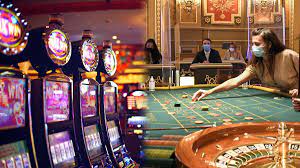Casinos have long captivated the imagination of people around the world, serving as places of thrill, entertainment, and even social interaction. The allure of the link alternatif paito experience is not merely about the games themselves but also encompasses the atmosphere, the variety of entertainment options, and the intricate psychology of gambling. In this article, we’ll delve into the multifaceted world of casinos, exploring their history, the games they offer, their cultural significance, and the evolving landscape of gambling in the digital age.
A Brief History of Casinos
The roots of gambling can be traced back to ancient civilizations. Evidence of dice games can be found in archaeological sites dating back to 3000 BC. However, the modern concept of a casino originated in Italy during the 17th century with the establishment of the first official gambling houses, known as “ridotti.” These venues provided a place for the elite to indulge in games of chance away from the prying eyes of society.
As gambling gained popularity, casinos began to sprout up across Europe, particularly in France and England. The famed Casino de Monte-Carlo opened in 1863, setting a new standard for luxury and grandeur. This expansion continued into the 20th century, culminating in the establishment of Las Vegas as the gambling capital of the world. Today, casinos are not just confined to physical locations; they have transcended boundaries and entered the digital realm, offering a plethora of online gaming options.
The Games of Chance
Casinos offer a diverse array of games, each with its own unique rules and strategies. The most iconic games include:
- Slot Machines: These are often the first choice for many casino-goers due to their simplicity and potential for big payouts. Modern slot machines feature elaborate themes and interactive elements, creating an immersive experience.
- Table Games: Classics like blackjack, poker, and roulette require a mix of skill and luck. Blackjack, for instance, is a strategic card game where players aim to beat the dealer’s hand without exceeding 21. Poker has various variations, with Texas Hold’em being the most popular, emphasizing both skill and psychological tactics.
- Craps: This lively dice game creates an energetic atmosphere as players place bets on the outcome of the roll. The communal nature of craps fosters a sense of camaraderie among players.
- Sports Betting: As legalization spreads, sports betting has become increasingly popular, allowing fans to wager on their favorite teams and events. This integration of sports into the casino experience has attracted a new demographic of gamblers.
The Psychological Aspects of Gambling
Understanding the psychology behind gambling is crucial to appreciating the casino experience. Many people are drawn to casinos due to the thrill of risk-taking and the potential for reward. The concept of “loss aversion,” where individuals prefer avoiding losses over acquiring equivalent gains, plays a significant role in gambling behavior. This leads players to chase losses, often resulting in prolonged gambling sessions.
Casinos are designed to create an enticing environment that encourages play. From the absence of clocks to the use of bright lights and engaging sounds, everything is crafted to immerse players in the experience. The “near miss” phenomenon, where players come close to winning, further entices them to continue playing, often leading to addictive behaviors.
The Cultural Impact of Casinos
Casinos have a profound impact on culture, influencing art, literature, and film. The glitz and glamour of Las Vegas have been romanticized in countless movies, such as “Casino Royale” and “Ocean’s Eleven,” portraying the casino as a hub of excitement and intrigue. Literature has also explored the complexities of gambling, with works like Fyodor Dostoevsky’s “The Gambler” delving into the psyche of a compulsive gambler.
Furthermore, casinos often serve as social hubs, where people from diverse backgrounds come together to share experiences. The interactions that occur in these spaces contribute to a unique social fabric, fostering connections and conversations.
The Digital Revolution and the Future of Gambling
In recent years, the rise of online casinos has transformed the gambling landscape. With the convenience of playing from home, a wider audience has been introduced to the world of gaming. Live dealer games, which provide a more authentic experience, bridge the gap between traditional and online gambling.
As technology continues to advance, the integration of virtual reality (VR) and augmented reality (AR) into the casino experience is on the horizon. These innovations promise to enhance immersion, allowing players to interact with games and each other in entirely new ways.
Conclusion
Casinos remain a fascinating intersection of chance, psychology, and culture. Their evolution from ancient gambling houses to modern entertainment powerhouses reflects societal changes and technological advancements. As we move into the future, the allure of the casino will likely continue to captivate new generations, making it an enduring symbol of risk, reward, and revelry. Whether through traditional gaming or the expanding online landscape, the world of casinos is sure to evolve, providing excitement and intrigue for years to come.




